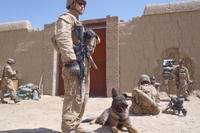The opinions expressed in this op-ed are those of the author and do not necessarily reflect the views of Military.com. If you would like to submit your own commentary, please send your article to opinions@military.com for consideration.
It was 1:30 p.m. on Tuesday, and I had just wrapped up an interview with a source for a story. My dog Truman, a pit bull who had attended college classes with me, walked the halls of Congress and had accompanied my National Guard unit during much of the pandemic response, was upstairs in my fiancee's office, snoozing in one of his dog beds that we have in nearly every room of the house.
It was then I realized that in four hours, I was going to lose Truman. I had to euthanize him. I imagined how I would be holding his paw, looking at his eyes as he slipped away. The seconds ticked by, and the fate of my best friend, who was going to be the best man at my wedding, was sealed.
Following my time serving in Afghanistan and during my college years, I had a lot of issues -- namely anxiety and drinking too much booze at inappropriate times of the day -- but fortunately nothing too intense or beyond the help of therapy at the Department of Veterans Affairs.
Read Next: Congress Passes Bill to Help Vets with Mental Health Conditions Get Service Dogs
I adopted Truman having no experience with dogs. He came from a shoddy animal shelter in Cincinnati and was sold as a "German Shepherd mix," probably because that's less scary to many than a pitbull. After a DNA test, we found out he indeed had about 10% shepherd in him so there was a grain of truth to the shelter's labeling.
I learned dogs are effectively emotional avatars for their owners. When I was relaxed, Truman was relaxed; when I was upset, Truman paced the apartment -- playing aggressively with his chew toys. That is when I learned I had a problem. My issues were fully articulated by a mutt, not the highly trained VA doctors or people who knew me well.
A VA doctor was able to identify the anxiety Truman was channeling and penned a letter prescribing Truman as an Emotional Support Animal, or ESA.
This is where things get controversial. ESAs are not service dogs, nor are ESAs an official part of VA policy. But they do fall under similar legal protections under the Fair Housing Act. VA doctors can prescribe them, but it isn't a part of typical treatment. ESAs have no training at all; the government didn't subsidize any costs associated with Truman. And I concede that ESAs have been abused by people who just want to skate by extra animal costs imposed by landlords and in one case someone tried to bring a peacock on a flight.
Truman was not meant to be in places only service dogs can go, but legally he could in most cases. ESAs were recently banned from flights, but my and my doctor's intentions weren't to bring him on planes and to grocery stores. He was just a regular dog, but that bond we had was critical. He did make me feel better and helped me regulate my emotions.
And I did benefit from being able to rent apartments with him that had pit-bull bans, which is shockingly common even in counties that don't have formal breed restrictions.

Pit bulls are a breed I have grown to love for their loyalty, ease of training, eagerness to please and companionship. They're often unfairly discriminated against by local officials and landlords, banning the breed based on farce data suggesting they are more prone to aggressive behavior. Sure, it's a strong breed and if they attack someone it's going to be bad, but tiny dogs are more likely to bite -- mostly because owners don't feel the need to take cute dogs seriously in training. Owners are bad, not breeds.
At one point I was doing research trying to find a nice van Truman and I could live in while I figured out a place that would rent to the two of us, until a doctor finalized the ESA paperwork.
Truman accompanied me virtually everywhere that was appropriate for a dog, both because he provided me with a level of emotional stability, but also, frankly, because he was my buddy.
He went to college classes with me. At previous jobs where I had to go into an office every day, he was a frequent visitor. He was even on TV on at least two occasions when I worked at Cincinnati's Fox affiliate. Once he helped deliver a message to viewers that if people were cold outside, Truman would be cold outside -- a warning to bring your pets in during cold-weather snaps. Ironically, Truman had two coats and was uncomfortably hot in any non-winter conditions. He loved frigid weather.
He was even with me on my first date with my now fiancee. During the date, he fell asleep on her lap, which was adorable. A stamp of approval I quickly came to agree with, and a reflection of the fact that he was an excellent wingman.
Truman also walked the halls of Congress with me. The Capitol is a massive labyrinth of offices and corridors that takes some getting used to. As a relatively fresh reporter covering the Hill and getting settled in a new city, I killed two birds with one stone walking him what would end up being miles in the Capitol while also learning the layout. He was popular among staffers in some offices I would visit, serving as a morale booster, and of course got pets from lawmakers who came to rare bipartisan agreement that he was a good boy.
It was also a good avenue to build relationships, and therefore sources that would later be helpful in my reporting. Stressed out, underpaid Hill staffers got to play with a dog, and Truman got good exercise.
I also served part time in the National Guard while pursuing my reporting career and, like most soldiers, was activated amid multiple domestic missions. Unfortunately, the Guard does not supplement pet boarding fees or offer any solutions for troops who must leave their critters behind. Don't hold your breath for governors to spend political capital, and taxpayer dollars for doggy day care for troops.
Truman accompanied my unit during much of the pandemic response, holding down the fort at our hotel and getting significant play time with soldiers. When one soldier was tired of petting or playing tug of war with Truman, there was another hero ready to entertain the dog. Again, a massive boost to morale. Truman served his country.
The VA's own research shows service dogs, the trained ones, not ESAs, can be critical recovery tools for veterans. But I would suggest ESAs, the untrained mutts, can also be effective. My issues were not as severe as those veterans who need those expensive, professional pups. But there is a class of veterans or anyone with mental-health issues that aren't severe enough to warrant a service dog, for whom a legally protected companion can be a monumental boost to morale and treatment.
Suicide and metal health are brought up constantly by military leaders and lawmakers. Seldom have I heard of specific solutions. It's always a vague program, a sign to be hung up asking soldiers not to kill themselves, a PowerPoint presentation saying the military and VA have all these options -- but nothing concrete, other than a hotline meant for when things have gone too far, and VA Committee lawmakers urging something needs to be done. We never get to that something. Dogs will not work for everyone, but Truman helped me.
The VA warns of concerns about what happens to a veteran's mental health when the dog dies. For me, it's been devastating. But I suspect that devastation is the same as anyone who has to put their pooch down. Truman bought me critical time to figure things out and find other avenues to nurture my mental health. My recommendation to others is that the dog will not solve all your problems, but they're a hell of a companion and mental-health supplement. I owe that dog everything.
The veterinarian hospital does the best they can to be respectful. There's a special room in the back where the dogs are put down and a side door for the now previous owners to walk out so other patients don't have to watch them depart upset, having just terminated a family member.
They let you pay ahead of time. While my fiancee and I were grieving, we had to pick out an urn for Truman's ashes. In a darkly comedic twist, the urns are listed on a stiff physical menu, laminated because it's always held by people crying.
I made Truman's last days the best I could. He was insatiable, but I'd rarely let him gorge. But in his final days, he ate whatever he wanted. I got him fries, two double cheeseburgers and chicken nuggets at McDonald's. For another meal, my fiancee made a steak, and a second one for the morning where he'd also get some eggs. His final meal was rotisserie chicken with a deep snowbank of shredded cheese.
The Veterans Crisis Line can be reached 24 hours a day, 7 days a week by calling 1-800-273-8255 and pressing 1, or by texting 838-255 or engaging via the Crisis Line's website.
-- Steve Beynon is a reporter for Military.com based in Washington D.C. He specializes in covering ground combat. An Afghanistan war veteran, serving over a decade as a cavalry scout, he currently serves as a non-commissioned officer in the National Guard.
















